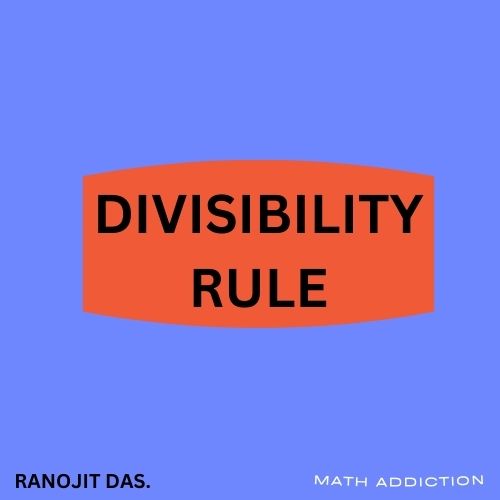If you are wanted to know why divisibility rules are important in math then your search ends here. Divisibility rules are important because they provide quick methods to determine if a number is divisible by another number without performing actual division. This is particularly useful in various mathematical calculations, simplifying tasks such as prime factorization, simplifying fractions, and identifying factors. Knowing these rules can save time and streamline problem-solving in math.

Table of Contents
What is Divisibility Rule?
Divisibility rule are mathematical shortcuts or criteria that help determine whether one number is divisible by another without actually performing division. These rules are especially valuable in situations where quick mental calculation are necessary or when dealing with large number.
Where We Used Divisibility?
Divisibility is used in various fields such as mathematics, computer science, and cryptography. In mathematics, divisibility helps in simplifying fractions, finding factors of numbers, and understanding properties of integers. In computer science, it’s crucial for algorithms dealing with prime numbers, and checking for errors in computations. In cryptography, divisibility is fundamental for creating and breaking codes, especially in prime factorization-based encryption methods like RSA.
Why divisibility rules are important?
Divisibility rules are really useful for testing whether a number is a multiple of another or to help to check for prime numbers.
- Efficiency: Divisibility rules allow for rapid mental calculations, which can be particularly useful in exams, competitions, or when solving problem on the fly. Instead of performing long division, which can be time consuming, you can quickly apply these rules to determine divisibility.
- Prime factorization: Divisibility rules are often used in conjunction with prime factorization. By quickly identifying divisibility, you can break down numbers into their prime factors more efficiently. This is crucial in various mathematical operations, such as simplifying fractions or finding the greatest common divisor (GCD) and the least common multiple(LCM) of numbers.
- Problem-solving– Divisibility rules provide valuable insights into the properties of numbers. They help identify patterns and relationship between numbers, enabling problem-solvers to devise strategies for tackling more complex mathematical problems. For example, recognizing that a number is divisible by both 2 and 3 allows you to infer that it’s also divisible by 6 without performing additional calculations.
- Number theory: Divisibility rules are an integral part of number theory, a branch of mathematics that explores the properties and relationships of numbers. By understanding these rules, you gain deeper insights into the structure of numbers and their divisibility properties. This knowledge forms the foundation for more advanced concepts in mathematics.
- Educational tool: Divisibility rules serve as educational tools for teaching mathematical concepts to students. They help students develop number sense and critical thinking skills by encouraging them to explore patterns and relationships within numbers. Additionally, mastering divisibility rules builds confidence and fluency in arithmetic, which are essential for further studies in mathematics.
- Real-World Applications: Divisibility rules have practical applications in various real-world scenarios, such as evenly distributing items among a group of people, determining the number of equal-sized groups that can be formed, or verifying the accuracy of calculations in fields like finance and engineering.
- Number Identification: Divisibility rules help in identifying prime numbers, composite numbers, and factors of numbers efficiently. This is particularly useful in cryptography, where prime numbers play a crucial role in creating secure encryption algorithms.
- Interdisciplinary Connections: Divisibility rules have connections to other disciplines beyond mathematics, such as computer science, physics, and engineering. They are utilized in various interdisciplinary applications, including digital signal processing, error detection and correction in communication systems, and designing efficient algorithms for numerical computations.
- Cultural and Historical Significance: Divisibility rules have historical and cultural significance, as they have been developed and refined over centuries by mathematicians from different civilizations. Studying divisibility rules provides insights into the mathematical achievements of ancient civilizations and their contributions to the development of mathematics as a discipline.
Summary:
Overall, divisibility rules play a crucial role in mathematics by providing efficient methods for determining divisibility, facilitating problem-solving, and fostering a deeper understanding of number theory. Whether you’re student, a professional mathematician, or simply someone who enjoys mathematical puzzles, knowing and applying divisibility rules can enhance your mathematical proficiency and appreciation.
Recommended Reading:
Difference Between Place Value and Face Value.
FAQs
Q.1 What is divisibility?
Answer- Divisibility is the ability of one number to be divided by another number without leaving a remainder.
Q.2 What is the divisibility rule of 5?
Answer- If the last digit of a number is 0 or 5, then a number is divisible by 5.
Q.3 What is the divisibility rule of 3?
Answer- If the sum of the digits of a number is divisible by 3, then the number is also divisible by 3.
Q.4 Are divisibility rules important?
Answer- Divisibility rules are very important for testing whether a number is divisible by another number.
Q.5 Who invented divisibility rule?
Answer- Divisibility rules were developed over time by various mathematicians; there isn’t a single inventor.
Q.6 What is the advantages of divisibility?
Answer- Divisibility rules help us to quickly determine if a number can be divided by another number without doing actual division.
Q.7 How is divisibility rules used in our daily life?
Answer- Divisibility rules are very important in our daily life. For example: Divisibility rules can be handy when calculating time intervals, such as figuring out how many hours or minutes are in a given number of days.
